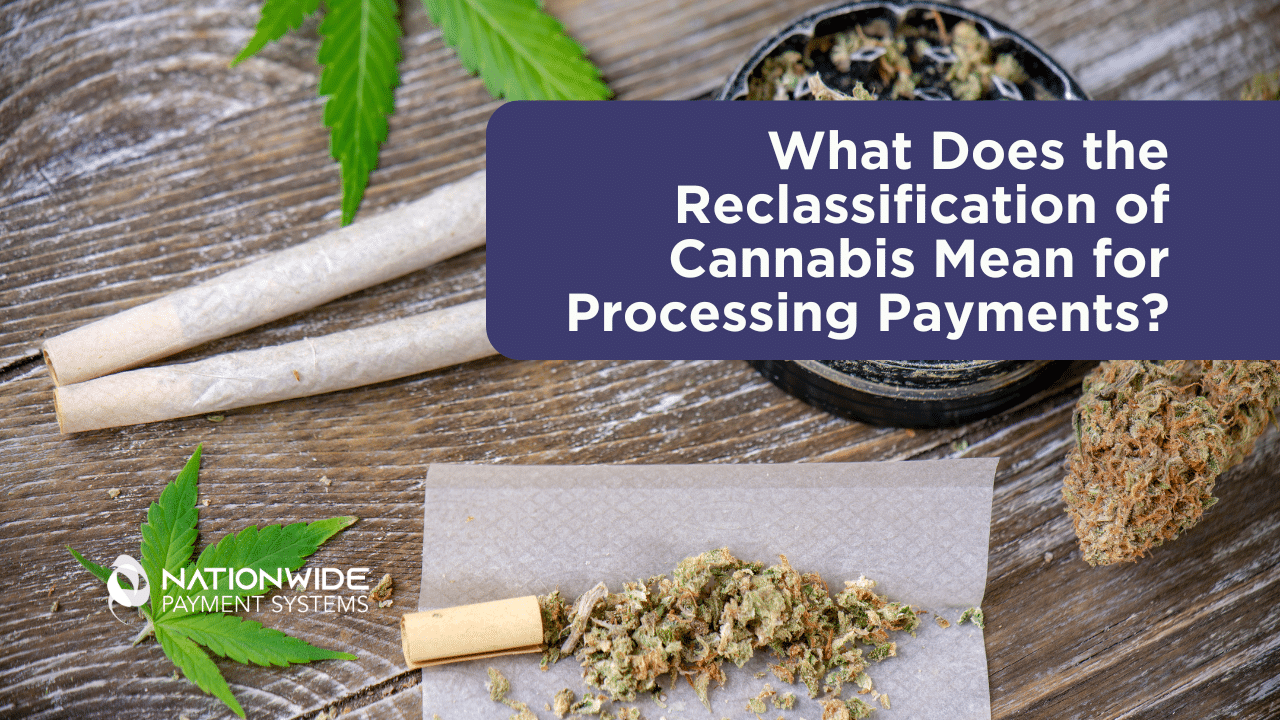What Does the Reclassification of Cannabis Mean for Processing Payments?

The reclassification of cannabis has been a significant step in recognizing the industry’s legitimacy. However, it falls short of addressing one of the most critical issues cannabis businesses face today: payment processing. Despite the reclassification, cannabis dispensaries will continue to struggle with obtaining merchant accounts and bank accounts, severely hampering their operations until the Safe Banking Act is passed by both the House and the Senate and signed into law by the President of the United States.
Legislative Efforts: SAFE Banking Act and SAFER Banking Act
Two primary legislative efforts, the SAFE Banking Act and the SAFER Banking Act, aim to resolve these banking and payment processing challenges.
SAFE Banking Act:
- If passed, the SAFE Banking Act would allow cannabis businesses to access traditional banking services, including the ability to obtain merchant accounts. This would enable these businesses to process credit and debit card payments like any other business.
- The SAFE Banking Act must pass through the House and Senate and be signed into law by the President for it to take effect. Its passage would mark a significant milestone in normalizing financial operations for the cannabis industry.
SAFER Banking Act:
- The SAFER Banking Act allows employees of cannabis businesses to deposit their earnings into bank accounts. While this addresses an essential aspect of financial security for workers, it must also provide a comprehensive solution for the companies themselves. Many payroll companies do not handle cannabis dispensaries.
- The act offers little relief for cannabis businesses that need to manage large amounts of cash due to their inability to process electronic payments.
Current Payment Solutions: Workarounds, Cash, and ATMs
Due to the absence of proper banking solutions, cannabis businesses are forced to rely on alternative methods to process payments:
Cash:
Many dispensaries operate entirely in cash, which poses significant risks, including theft and difficulties in managing large cash reserves. Cash-only operations also complicate the process of paying taxes and other expenses.
ATMs:
Some businesses have installed ATMs on-site to facilitate cash withdrawals, allowing customers to withdraw cash to make purchases. While this provides a temporary solution, it is inconvenient for customers and needs to address the root of the problem. These ATMs have to be supplied by an outside company and the cash provided by that outside company to be compliant. The dispensary can not load the money into the ATMs and comply with current laws. Businesses should refrain from loading cash they take in and then loading it into an ATM. That violates Anti-money laundering laws and can easily be spotted by your bank. Your bank account will be shut down, and you will probably be asked to leave the bank; repeated offenses will result in your business not operating an ATM any longer.
Workarounds:
Various workarounds have emerged, such as third-party payment processors and digital wallets. However, these solutions often come with high fees and the risk of your funds being held, the service shut down, or your money being lost.
Cannabis Related Busiensses:
Some processors and banks support CBD, HEMP, DELTA Products, Pipes, Bongs, Lights, Doctors, and more. At Nationwide Payment Systems, we do not treat these business types as High-Risk. We have several banks that will work with these business types, and they understand them. As long as the merchants are compliant, they can get processing at competitive rates.
Congressional Challenges and Economic Considerations
Given the significant economic benefits that could come from fully integrating cannabis businesses into the financial system, it is perplexing that Congress has been slow to act. The potential tax revenue from the cannabis industry could help alleviate the substantial deficit faced by the United States. By allowing these businesses to operate like any other, the government could collect payroll, sales, and other business-related taxes more efficiently.
Political Disagreements and Regulatory Complexities:
- The slow progress in Congress can be attributed to political disagreements and the regulatory complexities associated with cannabis. The stigma surrounding cannabis also plays a role, as some lawmakers are hesitant to support legislation that appears to legitimize the industry.
Operational Challenges for Cannabis Businesses:
- The inability to access traditional banking services forces cannabis businesses to operate under challenging conditions. Managing large amounts of cash is not only risky but also inefficient. It complicates payroll, taxes, and other essential business operations.
Why Congress Needs to Act
The current legislative gridlock affects cannabis businesses and deprives the government of substantial tax revenues. With the U.S. facing a huge deficit, it is in Congress’s best interest to pass the SAFE Banking Act. This would not only provide a safer, more efficient operating environment for cannabis businesses but also ensure that the industry is properly regulated and taxed.
The reclassification of cannabis has yet to deliver the necessary solutions for payment processing and banking for cannabis businesses. The passage of the SAFE Banking Act is crucial for integrating these businesses into the financial system, thereby ensuring their growth and contribution to the economy. Until then, dispensaries will continue to rely on inconvenient and risky workarounds, cash transactions, and ATMs. It is time for Congress to recognize the economic potential of the cannabis industry and take decisive action to support its integration into the financial system.
Contact us for more information to find out how Nationwide Payment Systems can help your Cannabis business or cannabis-related business. There are solutions for cannabis-related businesses.








